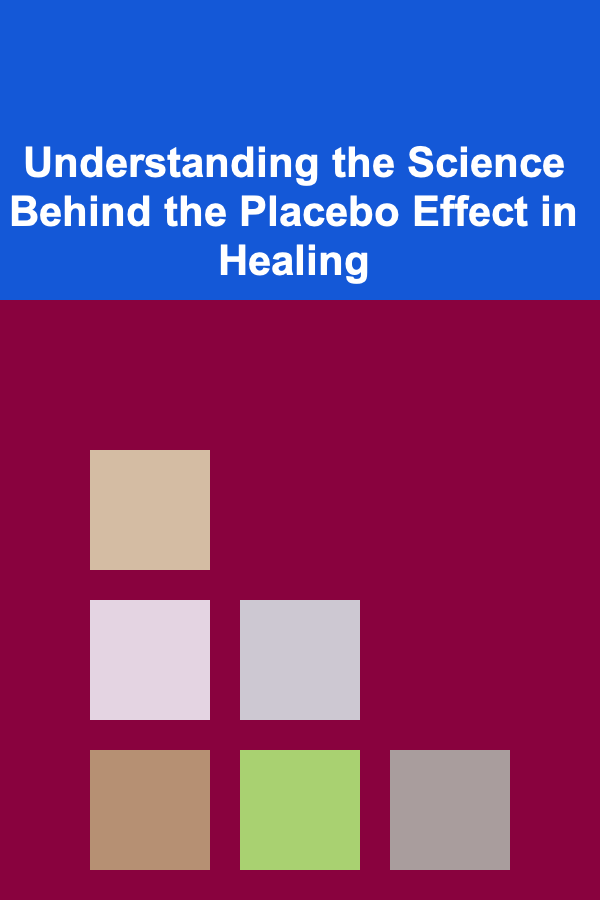
Understanding the Science Behind the Placebo Effect in Healing
ebook include PDF & Audio bundle (Micro Guide)
$12.99$9.99
Limited Time Offer! Order within the next:

The placebo effect is a fascinating and often misunderstood phenomenon in medicine and psychology. It refers to the measurable, observable, or felt improvement in health or well-being not attributable to any active treatment. In essence, it's the healing that occurs simply because a person believes they are receiving a beneficial treatment, even if that treatment is inert, inactive, or a sham. While often dismissed as "just psychological" or "all in the mind," a growing body of scientific evidence reveals the complex and intricate neurobiological mechanisms underpinning the placebo effect, offering valuable insights into the body's inherent capacity for self-healing and the powerful connection between mind and body.
The Historical Context and Evolution of Understanding
The placebo effect has been recognized in medicine for centuries, though its scientific investigation is relatively recent. Historically, healers and physicians often prescribed remedies that were, in hindsight, ineffective, yet patients frequently reported feeling better. This was often attributed to the patient's faith in the healer or the ritualistic aspects of the treatment process. Initially, the placebo effect was viewed as a nuisance, a confounding variable in clinical trials that needed to be controlled for in order to accurately assess the efficacy of new drugs and therapies. Researchers focused primarily on eliminating the placebo effect from studies, rather than exploring its underlying mechanisms.
However, as research methodologies became more sophisticated and neuroimaging techniques advanced, scientists began to appreciate the placebo effect not as a mere error, but as a legitimate physiological response with measurable effects on brain activity, hormone levels, and immune function. The pivotal shift was the recognition that the placebo effect is not just about "positive thinking" or "suggestion," but rather involves complex neurobiological processes that can modulate pain, mood, motor function, and even disease progression. This realization has led to a surge of research aimed at understanding the specific brain regions, neurotransmitters, and signaling pathways involved in mediating placebo responses.
Key Neurobiological Mechanisms Underlying the Placebo Effect
Several key neurobiological mechanisms have been identified as playing crucial roles in the placebo effect:
1. Endogenous Opioid System: Pain Relief and Placebo Analgesia
Perhaps the most well-studied aspect of the placebo effect is its role in pain relief, often referred to as placebo analgesia. Research has consistently shown that placebo treatments can significantly reduce pain perception, and this reduction is often mediated by the activation of the endogenous opioid system. This system involves the release of natural pain-relieving substances, such as endorphins and enkephalins, within the brain and spinal cord. Neuroimaging studies using PET (Positron Emission Tomography) scans have demonstrated that placebo administration can lead to increased opioid receptor binding in brain regions associated with pain processing, such as the anterior cingulate cortex (ACC), periaqueductal gray (PAG), and prefrontal cortex (PFC). Furthermore, the analgesic effects of placebos can be blocked by the administration of naloxone, an opioid receptor antagonist, providing strong evidence for the involvement of the endogenous opioid system.
The ACC is particularly important in pain perception as it's involved in the affective component of pain, how unpleasant the pain feels. Placebos can modulate activity in this region, making the pain feel less distressing. The PAG acts as a key control center for descending pain modulation pathways, which can inhibit pain signals traveling from the spinal cord to the brain. By activating the PAG, placebos can enhance the body's natural pain-relieving mechanisms. The PFC plays a role in cognitive appraisal and expectation, and its activation by placebos may contribute to the individual's perception of pain relief.
2. Dopamine System: Reward, Motivation, and Motor Function
The dopamine system, primarily associated with reward, motivation, and motor control, also plays a significant role in the placebo effect, particularly in conditions affecting motor function, such as Parkinson's disease. Studies have shown that placebo treatments can lead to increased dopamine release in the striatum, a brain region crucial for motor control and reward processing. This dopamine release can improve motor symptoms in Parkinson's patients, mimicking the effects of dopaminergic medications. The expectation of benefit and the anticipation of reward are thought to be key drivers of dopamine release in the context of the placebo effect.
In Parkinson's disease, the neurons that produce dopamine in the substantia nigra gradually degenerate, leading to motor impairments like tremor, rigidity, and slowness of movement. While placebo treatments can't stop this neurodegeneration, they can temporarily boost dopamine levels in the striatum, improving motor function and quality of life. This suggests that the placebo effect can tap into the brain's inherent plasticity and compensatory mechanisms.
3. Cognitive Expectations and Learning
Cognitive expectations, shaped by prior experiences and beliefs about treatment efficacy, are crucial determinants of the placebo effect. When individuals expect a treatment to be effective, their brains prepare for the anticipated outcome, leading to physiological changes that can mimic the effects of the active treatment. This expectation-driven response is mediated by various brain regions, including the PFC, which is involved in cognitive control and decision-making. Learning mechanisms, such as classical conditioning, also contribute to the placebo effect. If a person repeatedly experiences pain relief after receiving a particular treatment, even if it's a placebo, they may develop a conditioned response, whereby the mere sight or administration of the placebo triggers the release of endorphins and other pain-relieving substances.
Consider the scenario of a patient who has previously experienced significant pain relief from a specific medication. If they are then given a placebo that resembles the medication, their brain may automatically activate the same pain-relieving pathways, even though the placebo contains no active ingredients. This highlights the power of past experiences in shaping future responses to treatment.
4. Immune System Modulation
Emerging evidence suggests that the placebo effect can also influence the immune system. Studies have shown that placebo treatments can modulate immune function, affecting the levels of cytokines (signaling molecules that regulate immune responses), natural killer cell activity, and other immune parameters. These effects are likely mediated by the communication between the brain and the immune system via the hypothalamic-pituitary-adrenal (HPA) axis and the autonomic nervous system (ANS). For example, placebos have been shown to reduce inflammation in patients with inflammatory bowel disease and to enhance immune responses in individuals receiving vaccines.
The precise mechanisms by which placebos influence the immune system are still being investigated, but it's thought that the expectation of benefit can activate the HPA axis, leading to the release of cortisol, a hormone that can suppress inflammation. Similarly, the ANS, which controls involuntary functions like heart rate and digestion, can be modulated by placebos to influence immune cell activity and cytokine production. This suggests that the placebo effect may have therapeutic potential in autoimmune diseases and other conditions involving immune dysregulation.
5. The Role of the Brain-Gut Axis
The brain-gut axis, the bidirectional communication network between the brain and the gut, is increasingly recognized as a key player in the placebo effect, particularly in gastrointestinal disorders such as irritable bowel syndrome (IBS). The gut microbiota, the complex community of microorganisms residing in the digestive tract, can influence brain function and behavior via the production of neurotransmitters, hormones, and other signaling molecules. Placebo treatments can alter the composition and activity of the gut microbiota, potentially leading to changes in brain function and symptom relief in IBS patients. For example, placebos have been shown to reduce gut inflammation and improve bowel habits in some IBS sufferers.
The exact mechanisms by which placebos influence the gut microbiota are not fully understood, but it's thought that the expectation of benefit can modulate the ANS, which controls gut motility, secretion, and immune function. This, in turn, can affect the growth and activity of specific microbial species, potentially leading to changes in gut-brain communication. This area of research is still in its early stages, but it holds promise for developing new and more effective treatments for gastrointestinal disorders.
Factors Influencing the Magnitude of the Placebo Effect
The magnitude of the placebo effect can vary considerably depending on several factors:
- Patient Expectations: The stronger the patient's belief that a treatment will be effective, the larger the placebo effect is likely to be. Factors like the physician's demeanor, the information provided about the treatment, and the patient's prior experiences can all influence expectations.
- The Nature of the Treatment: More elaborate or invasive treatments, such as injections or surgery, tend to elicit stronger placebo effects than simpler treatments like pills. The ritualistic aspects of the treatment process can also contribute to the placebo effect.
- The Condition Being Treated: The placebo effect is generally more pronounced in conditions that are subjective and influenced by psychological factors, such as pain, depression, and anxiety. It is less effective in treating objective diseases like cancer or bacterial infections.
- The Setting: The context in which the treatment is administered can also influence the placebo effect. A supportive and empathetic healthcare environment can enhance the placebo response.
- Genetic Predisposition: Emerging research suggests that genetic factors may also play a role in determining an individual's susceptibility to the placebo effect. Variations in genes related to dopamine and opioid signaling have been linked to differences in placebo responsiveness.
Ethical Considerations and the Future of Placebo Research
The ethical implications of using placebos in clinical practice are complex and controversial. While some argue that placebos should not be used because they involve deception, others contend that they can be ethically justifiable if used responsibly and with the patient's informed consent. One potential approach is to use "open-label placebos," where patients are explicitly told that they are receiving a placebo, but are also informed about the potential benefits of the placebo effect. Studies have shown that open-label placebos can still be effective in some conditions, suggesting that the placebo effect can occur even when individuals are aware that they are not receiving an active treatment. This may be due to the expectation of benefit and the engagement of the body's self-healing mechanisms.
The future of placebo research lies in further elucidating the neurobiological mechanisms underlying the placebo effect and in exploring its potential therapeutic applications. By understanding how the brain and body interact to produce placebo responses, we can develop more effective and personalized treatments for a wide range of conditions. This includes optimizing the placebo effect in clinical trials to reduce the sample sizes needed to detect drug efficacy, as well as developing new therapeutic strategies that harness the power of the placebo effect to enhance healing and improve patient outcomes. Furthermore, a deeper understanding of the placebo effect can help us to better appreciate the importance of the patient-physician relationship, the therapeutic environment, and the patient's own beliefs and expectations in promoting health and well-being.
For example, future research could focus on identifying biomarkers that predict placebo responsiveness, allowing clinicians to tailor treatment approaches to individual patients. Studies could also explore the potential of combining placebo treatments with conventional therapies to enhance their effectiveness. Moreover, investigating the role of specific psychological factors, such as mindfulness and optimism, in modulating the placebo effect could lead to the development of interventions that promote self-healing and resilience.
Conclusion
The placebo effect is far more than just a "trick of the mind." It is a complex and multifaceted phenomenon with a solid neurobiological basis. Understanding the brain regions, neurotransmitters, and signaling pathways involved in mediating placebo responses is crucial for developing more effective and ethical approaches to healthcare. By harnessing the power of the placebo effect, we can tap into the body's inherent capacity for self-healing and improve patient outcomes in a wide range of conditions. As our understanding of the placebo effect continues to evolve, it holds the promise of transforming the way we approach medicine and healthcare in the future, emphasizing the importance of the mind-body connection and the patient's own role in the healing process. It represents a powerful reminder of the interconnectedness of our physical and psychological well-being and the remarkable ability of the human body to heal itself, given the right conditions and expectations.

How to Choose the Right Investment Strategy for Your Lifestyle
Read More
How to Leverage Social Media to Sell Second-Hand Items
Read More
How to Manage Finances During Major Life Transitions
Read More
How to Organize a Joint Budget with Your Partner
Read More
How to Build Unshakeable Confidence
Read More
Crafting Effective Q&A Pairs with ChatGPT: A Deep Dive
Read MoreOther Products

How to Choose the Right Investment Strategy for Your Lifestyle
Read More
How to Leverage Social Media to Sell Second-Hand Items
Read More
How to Manage Finances During Major Life Transitions
Read More
How to Organize a Joint Budget with Your Partner
Read More
How to Build Unshakeable Confidence
Read More